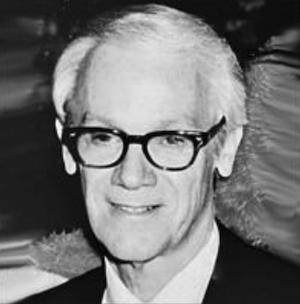By Ryan Rodriguez
When the Phi Beta Kappa Senate chose Kenneth M. Greene to serve as Secretary and CEO of the Society in 1975, then ΦBK President John Hope Franklin stated that Greene was “admirably qualified for the position, both as a humanist and as an administrator.”
Originally from Cleveland, Greene attended Brown University as a John Jay Scholar, where he graduated ΦBK and summa cum laude in 1942. Immediately following graduation, he served in the U.S. Army from 1942 to 1946, rising in rank from private to captain. He served as a line officer in the 3rd Infantry Division in France. Twice wounded in combat, he was awarded the Croix de Guerre, the Silver Star, the Bronze Star, the Combat Infantryman Badge, and the Purple Heart with oak leaf cluster. After the war, he studied at Columbia University, where he earned both an M.A. and a Ph.D. in English literature.
When Greene agreed to head Phi Beta Kappa’s national office in Washington, D.C., he ended a four-year tenure as president of Lasell Junior College in Newton, Massachusetts. There, he brought remarkable peace to a campus inflamed by student strikes and confrontations, initiating procedures to improve the college’s administrative organization as well as a fundraising campaign to increase endowment and scholarships. Before that, Greene served as a professor of English at Simmons College in Boston, where he later chaired the Department of Education and then became director of the School of Education.
Greene retired from Phi Beta Kappa in 1989, at which time the Phi Beta Kappa Senate stated in a resolution of appreciation that he “has presided over the affairs of the Society with unmatched skill and intelligence and almost superhuman imperturbability . . . leaving as his legacy an organization immeasurably stronger than the one whose direction he assumed in 1975.”
Current Secretary and CEO of Phi Beta Kappa Frederick Lawrence offers similar words of praise. “He was a wise and kind man and was deeply devoted to ΦBK. We are all the beneficiaries of his contributions.” Jean Stipicevic, retired managing editor of The American Scholar magazine, also recalls Greene’s inspiring generosity, having personally helped Stipicevic’s family through a challenging period in their lives. “He was an elegant, down-to-earth Middlewestern gentleman who inspired loyalty and the respect of his staff.”
Benevolence and steadfast leadership were Greene’s best traits. “There was such mutual respect and loyalty throughout the office during Dr. Greene’s years as ΦBK Secretary,” says Kathy Navascues, past director of the Visiting Scholar Program. “We were all confident that his decisions were in the very best interest of the staff and the Society.” Doris Lawrence, who has worked at the national office assisting Phi Beta Kappa’s members and chapters for more than 50 years, shares similar sentiments: “Dr. Greene always had a positive attitude. He was personable, constantly interacted with the staff, and treated us like family.”
Facilities Manager Bill Colella also recalls Greene’s time as CEO and shares what many who knew him felt about working for him. “The chief features of Dr. Greene’s character were benevolence and fairness,” Colella observed. “He was the best!”
Greene passed away December 16, 2021, at his home in Falls Church, Virginia, surrounded by his loving family. He was 101. He is survived by his wife of 72 years, Anne F. Greene; two daughters, Jocelyn Greene (John Beyrle) of McLean, Virginia, and Janet Greene (Daniel McIntosh) of Minneapolis, Minnesota; a son, Kenneth Greene, Jr. (Cathy Flax) of Baltimore, Maryland; and five grandchildren. A burial service at Arlington Cemetery will be scheduled in the spring of 2022.
Ryan Rodriguez is a senior at Rutgers University majoring in English literature. He was inducted into Phi Beta Kappa there in May 2021. Rutgers University is home to the Alpha of New Jersey chapter of Phi Beta Kappa.




